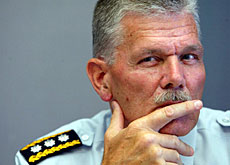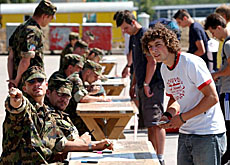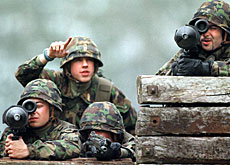Swiss army adapts to the modern world

Switzerland’s militia army is currently undergoing its most radical overhaul since the Second World War.
In an interview with swissinfo, Christophe Keckeis, head of the armed forces, says reform is needed to enable the army to respond to a changing world.
Keckeis will assume the role of Chief of Staff of the Swiss army next year. The new role was created as part of the restructuring of the army; previously the position was only filled during times of war.
swissinfo: What is the purpose of these army reforms?
Christophe Keckeis: The army’s current structure needs to evolve into one that is modular, allowing it to undertake specific security missions.
These modules, founded on the army’s expertise in different areas, will enable it to carry out these missions.
This is exactly what happened at the G-8 summit in June and the World Economic Forum summit in Davos, when we placed 6,000 men at the disposal of the authorities.
swissinfo: What do you think are the dangers facing Switzerland and the European Union?
C.K.: Today you can pick out a lot of conflicts, without necessarily talking about war. Organised crime, human trafficking, drugs and terrorist attacks are all the order of the day.
Until now, Switzerland has been spoilt and hasn’t yet accepted that these tensions are part of our world. We have to be extremely vigilant to ensure we don’t find terrorism on our own doorstep.
swissinfo: What sort of missions will the new army undertake?
C.K.: Apart from war, there are certain other crisis situations that require security operations and which didn’t exist in the past. And the army must be deployed in such events.
These new security tasks, which have been decided by the government, take up more than half of the army’s resources. These include patrolling the borders, protecting embassies, protecting sensitive installations, etc.
We are therefore moving towards a far more flexible army, able to respond to domestic security needs.
swissinfo: Shouldn’t these tasks be undertaken by private firms?
C.K.: The justice ministry and the police are responsible for internal security. But for years now, cantonal police force resources have been scaled back for financial reasons.
Given that police and customs officials are struggling with their workload, the army is the only force with the resources required to handle domestic security.
Certainly, private companies offer security services, but politicians have realised the army has amazing potential in terms of personnel, material and training.
But it must be made clear that the final decision on internal security and how it is coordinated rests with the police.
swissinfo: What lessons did you learn about internal security from the army deployment at the G-8 summit?
C.K.: It was a very instructive experience. It was the first time we had embarked on a mission involving resources from other countries, and this allowed us to put into practice the concept of cooperation to ensure security.
We identified problems with competence. For example, who should analyse the situation and the risks? Who has the competence to take the final decision?
swissinfo: Given the new role of the army, is its deployment overseas still important too?
C.K.: More than ever. Gaining first-hand experience of the way other armed forces conduct themselves helps our forces to better judge the actions of other troops.
Overseas engagements show our forces how to create stability and to carry out security missions in critical situations, where every action can have major consequences.
But that is not the main reason. For example, stabilising the situation in the Balkans instead of waiting until the effects are felt in Switzerland is a far less expensive option.
To resolve problems at source, Switzerland must engage itself abroad.
swissinfo-interview: Armando Mombelli and Jean-Didier Revoin
On May 18, the Swiss people approved Army XXI, the plan for the most ambitious overhaul yet of the army.
The size will be reduced by a third: from 350,000 to 220,000 soldiers (including 80,000 reservists).
Obligatory military service will be reduced from 300 to 260 days.
The defence budget, currently SFr4.3 billion ($3.1 billion), will be cut by SFr300 million.
Some 2,000 jobs are expected to be cut between now and 2011.
1945: Christophe Keckeis is born in Neuchâtel
1989: After becoming a professional air force pilot, he becomes Chief of Staff of the Air Force.
2003: He is nominated Chief of Staff of the Swiss Army.
2004: Keckeis will be the first overall head of the Swiss army in peacetime, as part of a restructuring of the armed forces.

In compliance with the JTI standards
More: SWI swissinfo.ch certified by the Journalism Trust Initiative











You can find an overview of ongoing debates with our journalists here . Please join us!
If you want to start a conversation about a topic raised in this article or want to report factual errors, email us at english@swissinfo.ch.